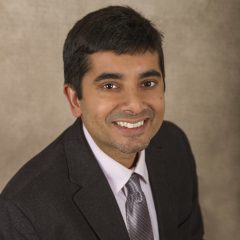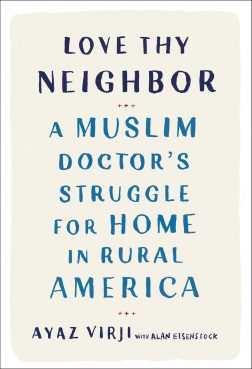(RNS) — Ayaz Virji had a well-paying position at a Pennsylvania hospital when he decided to uproot his family in 2013 and move to Dawson, Minn., a town with about 1,500 residents and the distinction of being “Gnometown, USA.”
Virji’s Muslim faith and values inspired him to look for a job that was more than just lucrative. In Dawson, he said, he felt he could provide what he called “dignified medicine,” spending time getting to know his patients in an underserved rural community.
Then came the 2016 election.

Ayaz Virji
Most Dawson residents had voted for President Trump. And many of Virji’s patients — stirred by Trump’s insistence that “Islam hates us,” his suggestion of a Muslim registry and his promise of a Muslim ban — began to question his family’s presence. As far as anybody knew, they were the first Muslim family to live in Dawson.
That’s when Virji discovered another vocation: speaking to Christian audiences about his faith in order to dispel myths about Islam.
The Rev. Mandy France — then an intern at a local Lutheran church — first invited Virji to give a talk titled “Love Thy Neighbor” in a school auditorium.
“When we did our first talk, people protested,” Virji said. “They said Muslims shouldn’t be allowed to speak publicly. And I’m like, you guys know me. I’m the doctor. I treat you guys.”
Since then, he said, he’s given more than 25 lectures. He and France even addressed the Evangelical Lutheran Church in America’s national celebration of the 500th anniversary of the Protestant Reformation in 2017.
Now Virji has turned his talk into a book titled “Love Thy Neighbor: A Muslim Doctor’s Struggle for Home in Rural America.”
“I hope people read the book, and I hope that it starts conversations. If it starts conversations — that’s all that it needs to do — then we’re going to be in a much better place,” he said.
Virji spoke to Religion News Service about his experience as a Muslim in rural America, what Christians and Muslims have in common and his new book. This interview has been edited for length and clarity.

“Love Thy Neighbor: A Muslim Doctor’s Struggle for Home in Rural America” by Ayaz Virji
What was the motivation for giving these “Love Thy Neighbor” talks?
I think the rhetoric of hate and fear really rose to new heights, and my family and I took it pretty hard, especially the comments that were being made and other things that were happening with our otherwise wonderful community. I was ready to leave the country. I didn’t want to live around people who wanted me on a registry or believed Islam hates us.
So I was very angry. It was then that Pastor Mandy came to me and said, “Hey, let’s do something about this.” I was really touched by that. Here you had somebody who didn’t have skin in the game, and she was probably even more offended than I was.
It took me a few days to kind of calm down, but I said, “You know what? That is the right thing to do. Let’s go out there educating.”
Has this always been your experience? Or was a switch flipped during the 2016 presidential campaign?
This is something my wife and I have really kind of tried to figure out. It must have been there before, but all of a sudden there’s this rhetoric, and people are buying it — that Muslims are here to impose Shariah law, that there’s this massive conspiracy. Whenever Trump had an opportunity to say something bad and just stupid, he would. It seems clear what he’s doing. He’s using hate and fear to win.
The hate gene — the hate neuronal synapse in the brain — is very strong. It’s in the limbic system, and it overpowers executive function in your frontal cortex and turns off the intellect, and he knows that. That, for me and my family, became the missing link that helped us understand how otherwise really amazingly good people — people who would otherwise give you the shirts off their back and do anything for you — would now start behaving this way.
What do you want Christians to understand about Muslims?
I think that the commonalities we have are far greater than the differences. Your average Muslim and your average Christian value the same things. They want to have a family, they want to take care of their livelihood, they want to be successful.
Over the last 20 years, at least from cable news, every time you see the word “Muslim,” you see “radical Islamic terrorism.” There’s no doubt that that exists and that’s wrong and that’s a cancer in our own religion. I wholeheartedly understand that and wish nothing more than to extract it.
But that’s not what Islam is, and if you look at the State Department’s country reports on terrorism and take all the radical Muslim groups together, they make up no more than 200,000 (people). That’s less than 0.01% of all Muslims. It would be unfair to go to Christians and say, “It’s people like Dylann Roof or the KKK or Jim Jones who define your religion.” If you want to know your neighbor, you would go to them. You wouldn’t go to hateful podcasts or websites.
What are the most common questions you are asked?
People ask about Shariah law, they ask about women and they ask about terrorism.
People ask if terrorism is justified in the Quran. They’ll pull out a passage here or there that, taken by itself, seems like it’s malevolent and dangerous, but, when taken in context, is clearly not the case.
I read the Bible to them. Jesus said, in Matthew, “I come not to bring peace. I come to bring the sword.” Now, if I were somebody who was disingenuous, I would take that statement, and I would show pictures of the United States bombing Iraq or what have you and say, “Hey, this is what Christians are doing. They’re trying to destroy the world.” That would be very disingenuous because Christianity is a religion of peace and love.
The misperception about women and inequality is funny because the Quran never mentions the headscarf. Where you hear the headscarf is actually in (Paul’s First Letter to the Corinthians). Paul says a woman should cover her hair when she prays. The Muslim construct of the covering of the hair — similar to what you would see with a Coptic Christian — comes more from hadith, from the prophet, not from the Quran.
What kind of reaction do you get from audiences?
Somewhere between 10 and 30% of the audience are not there to listen, they’re there to convert me. They call me the antichrist or tell me, “This isn’t real Islam. The real Islam is the Islam of Al-Qaida.” I’m not really there for those people. Those people have already made up their mind.
About half the people are very supportive. They believe in the message that Mandy and I are trying to tell people, and we’re not there for them either. We don’t need to preach to the choir.
But then there’s about 20, 30% of people who really don’t know. They really are just scared. The rhetoric has caused them to question certain realities. Those are the people we’re there for — the people who ask sincere questions. That’s where I think we’re turning the dial from fear back to love and, kind of, reality. We’re all in this together. We’re all human beings. We’re not the other, we’re the neighbor.
What do you think it will take for Christians and Muslims to come together at this polarized moment in our country?
If enough good people stand up and do something — whether that be writing editorials or getting involved somehow — I think we will, as a country, as a community, as communities across our country, be even better for it because we will have withstood hate from the top.
As you point out, a lot of people are exhausted by feeling like they always have to explain or defend themselves. How would you encourage them?
You can’t do difficult things without difficulty.
I hope that good people will get together and work together to dispel myths. That was kind of the rationale behind doing the book. You know, I can’t lecture my entire life, and I certainly don’t have unlimited vacation days. But if we can spread this message and it can hit even half a percent of people and motivate them, to just give them energy or something to move forward, then it will be a success.





